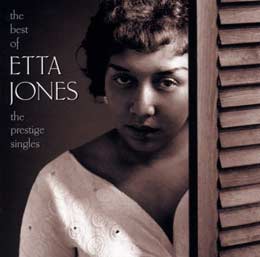
Etta Jones
| Dance With Me Henry | |
| Tweedle Dee |
Born Freda Gibbons, 17 August 1920, Worcester, Massachusetts, USA. Etta Jones grew up in New York and at 16, toured with Buddy Johnson.
She debuted on record with Barney Bigard's pickup band (1944) for Black & White, singing four Leonard Feather songs, three of which (including "Evil Gal Blues") were hits for Dinah Washington. Gibbs has been unfairly maligned by rock critics for building her career in the '50s by covering R & B hits of LaVern Baker and Etta James. In reality she was a genuinely talented pop vocalist, whose jazz-tinged approach reflected years of experience in the big band era, a period when there was no stigma attached to covers.
Her big break in the business came in 1936 when she joined the Hudson-DeLange Orchestra, recording for Brunswick Records. That led to a radio career in 1937, including YOUR HIT PARADE. There were also recording stints with the bands of Frankie Trumbauer (1940), Artie Shaw (1942), and Tommy Dorsey (1944). On the Jimmy Durante Camel Caravan radio show 1943-47, she received her trademark nickname when host Garry Moore dubbed her "Her Nibs, Miss Gibbs".
Gibbs first entered the charts in 1950 with a cover of Eileen Barton's "If I Knew You Were Comin I'd've Baked A Cake" (number 5 pop), and had her first number 1 hit with "Kiss Of Fire", a vocal version of the '30s tango instrumental "El Choclo".
After hitting with "Seven Lonely Days" (number 5 pop 1953), Gibbs achieved notoriety in 1955 when she hit with two note-for-note covers of R & B tunes -- "Tweedle Dee" (US pop number 2) by Baker and "Dance With Me Henry" (US pop number 1) by James. "Kiss Me Another" (US pop number 30) and "Tra La La" (US pop number 24) kept her in the public eye in 1956, but not for long. Her last chart record was "The Hula Hoop Song" (US pop Top 40 1958), which tried to ride the success of the silly toy fad. In the UK, Gibbs chart success was minuscule; two one-week appearances by "Tweedle Dee" and "Kiss Me Another" respectively.
. She recorded other songs during 1946-1947 for RCA and worked with Earl Hines (1949-1952). Jones' version of "Don't Go to Strangers" (1960) was a hit and she made many albums for Prestige during 1960-1965. Jones toured Japan with Art Blakey (1970), but was largely off record during 1966-1975. However, starting in 1976, Etta Jones (an appealing interpreter of standards, ballads, and blues) began recording regularly for Muse, often with the fine tenor saxophonist Houston Person. Some of her finest work has been from the last two decades. She died from complications of cancer on October 16, 2001, the day her last album, Etta Jones Sings Lady Day, was released.